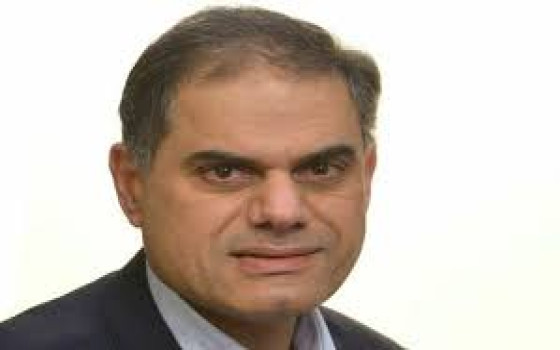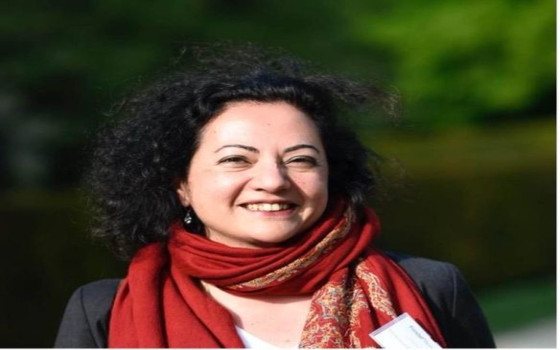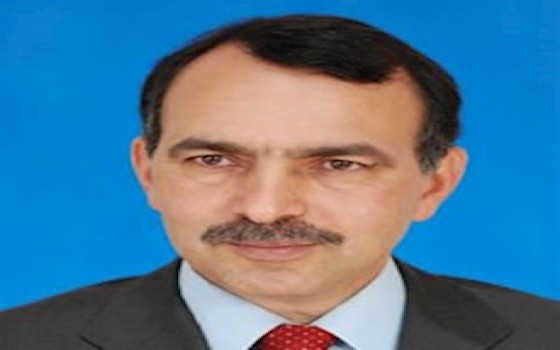Dr. Jihan Sfeir and the double identity weapon..... Written by Hassan Al-Balaawi

- Europe and Arabs
- Wednesday , 25 January 2023 17:1 PM GMT
Dr. Jihan Sfeir, a Lebanese researcher in Belgium, is the Arab eye on the Free University of Brussels, and it is the eye of this university on the Arab world, as it keeps pace with and contributes to the growing interest of Belgian universities in Arabic and Islamic studies in its various dimensions. In which Belgium gained its independence from the Netherlands in 1831, and there was no university of its own in Brussels, as is the case, for example, with the Dutch-speaking city of Louvain, which owns the Catholic University of Louvain since 1425, and the University of Brussels called itself free because it was seeking to find an independent university from The state and the church together in order to achieve academic freedom as it puts in its goals.
The University of Brussels, which is divided into two parts, one speaking in French and the other in Dutch, has a section entitled “Observatory of the Arab and Islamic Worlds” (OMAN), which was founded by Dr. Sfeir in 2015 because when she moved from Paris, where she finished her studies there and worked in prestigious scientific institutions, in In 2009 to study about the Arab world at the Free University of Brussels, I sensed a lack of global research centers on the Arab world compared to France, which has a colonial presence in the Arab region, whether it was in the Levant in Lebanon and Syria or in the Maghreb, which accordingly has a significant number of studies and research centers about the Arab world.
The reason for the lack of Arabic and Islamic scientific research in Belgium, as Sfeir says, is that Belgium’s colonial history is linked to Africa and not the Arab world, knowing that there is a center for studies on the Arab world at the University of Ghent and another at the University of Louvain-Leneuve, as Sfeir acknowledges, but that is not enough. Here came the idea of creating the observatory, so I worked first to form a team of researchers working in several faculties studying various sciences. There were people from the faculties of political science, social sciences, arts, and geography. The Arab and Islamic world, and the observatory gradually became a reference for Arab and Islamic studies in Belgium.
Although the observatory exists only in the Free University of Brussels because it is part of the Humanities Department, it began to weave partnerships from many centers of studies and research interested in the Arab world, not only in Belgium but also in France, and we have collaborating researchers, but not from the Free University of Brussels.
The Observatory of the Arab and Islamic Worlds became a reference for the Belgian media because of the presence of researchers specialized in the topics covered by the media, and these researchers became experts. Recently, the Belgian Federal Parliament asked Dr. Sfeir to come to speak in Parliament about the situation in Lebanon, before the specialized committee in Lebanon, and she spoke as an expert on the Lebanese issue. Thus, the observatory has become not only a platform for gathering researchers around the Arab and Islamic worlds, but it has also become a reference for introducing issues of the Arab and Islamic world to political institutions and the media.
Palestine has an important share in the observatory. One of the two coordinators of the observatory, after the resignation of the doctor, is the researcher Omar Jaberi Salamanca, who is of Palestinian origin. He works on the issue of electricity in Palestine and how Israel uses it as a tool to establish its control and colonization of the Palestinian people. As for the other coordinator of the observatory, Christian Oslon has been since almost A year in Palestine to achieve partnership and cooperation with Birzeit University, in addition to the work that Dr. Jihan herself is doing on Palestine, and for the attendance of 5 Palestinian students from Palestinian universities through European university partnerships and to present university theses on Palestine in various fields.
In 2022, Dr. Jihan resigned from the presidency of the observatory because she was appointed director of the Department of Human Studies at the university, which in addition to the observatory of the Arab and Islamic worlds contains 6 research centers working on other regions of the world, in Asia, Africa, America and Latin, in addition to centers dealing with central Europe, including It contains the Observatory of the Arab and Human Worlds, and there is a new center that deals with war sciences.
However, with the prestigious scientific status of Dr. Jihan, there is another aspect that is no less important than her scientific achievements, which is her association with Palestine. It is suitable to be the subject of a literary novel or a feature film and shows an aspect of the complex Palestinian situation, as she narrates it herself.
"I am Lebanese by father, Palestinian mother, and French at the same time," says Sfeir, "and when the war broke out in Lebanon in 1975, I was four years old and did not realize the extent to which this conflict could tear my Lebanese and Palestinian families apart."
Following the Nakba of Palestine in 1948, which led nearly 800,000 Palestinians to leave their land, homes, and property by force, for fear of the massacres that were being committed by the armed Zionist groups, her mother’s family, the Ayoub Badran family, left Haifa and Lagat to Lebanon and found themselves, like many Palestinian Christians. In the neighborhood of Ashrafieh in East Beirut, while the children, from the side of the mother’s family, and because of the war that divided Lebanon and Beirut in particular, between an eastern one with a Christian majority and a western one with a Muslim majority, they live in a state of division, as Nabil (Jihan’s uncle) was working as a researcher at the Palestinian Research Center Affiliated to the Palestine Liberation Organization, located in the Hamra neighborhood in West Beirut, and my uncle is one of the founders of this center and he worked with Anis Al-Sayegh as well as with Youssef Al-Sayegh. As for the aunt, her name was Yvette, she was an activist in the Lebanese Communist Party, in West Beirut, which housed the brothers Nada and Fouad And the four were committed to defending the Palestinian cause and engaged in the struggle from It is in its many stages.
Jihan's mother, Helen, was married to a Lebanese Maronite and lived in Antelias in the Sharkia region. As for her sister, Nadia, she also married a Lebanese Maronite, but they lived in the Hamra neighborhood until 1982.
In short, says the doctor, until the outbreak of the war (April 1975) we used to meet and visit as a family, but after this date we became separated, not only because of the seam lines separating West Beirut from East, but also because of the ideological dispute, even if my father did not appear, and in any Time, any hostility to the Palestinians, but the Christian environment in which we lived was inhabited by this hostility.
Our friends at school and our neighbors, the spokeswoman recalled, always reminded us that the Palestinians were terrorists and wanted to destabilize the Lebanese sovereignty, as were classified by the Christian militias. Therefore, we grew up in an environment dominated by anti-Palestinian rhetoric, and my mother had to accept that so as not to endanger us.
"During the war, Jihan recalls, my family was separated from the section related to my mother, and yet we continued to visit my grandparents who remained in Ashrafieh, and I loved listening to my grandmother, whose name was Soraya, who used to talk to me about her life in Palestine, as a theater actress in the Haifa Theater, and my grandfather, whose name was Iskandar, had a troupe A play, about which the Palestinian researcher Johnny Mansour wrote an article, and my grandfather was also an accountant in a supermarket, and my grandfather had a family extension of a Lebanese family that came to Palestine during the First World War, when Lebanon was exposed to famine at that time, then this family later returned to Lebanon, and thus When my grandfather and grandmother came to Lebanon, they were quickly able to obtain Lebanese nationality, and during the summer holidays that she used to spend in Mount Carmel, I imagined Palestine as a garden full of roses, in which people lived happily without worries that disturbed them, and with my mother’s family carrying an UNRWA card for Palestinian refugees, meaning that my mother She was carrying this card, but they settled in the Ashrafieh area.”
In 1986, after a short period of the "camp war" waged by the Amal movement, supported by the Syrian regime, against the Palestine Liberation Organization, the Palestinian refugee camps in West Beirut, specifically Shatila and Burj al-Barajneh, Jihan, who was then 14 years old, recalled that her aunt Yvette, who Her comrades in the Lebanese Communist Party used to call her “Dunya.” I took her to the Shatila and Burj al-Barajneh camps, and my aunt introduced me to the people she used to work with. The questions were about her memories in Palestine, and I recorded that on a videotape, and I documented her conversation in my doctoral dissertation later. “There, in the camps, she knew Marcel Khalife’s songs, danced the Dabkeh, and returned to her home with a keffiyeh that was confiscated from her.
"Since that moment," Jihan recalls, "I needed to learn about the history of Palestine and to know why part of my roots were hidden from me, and they are roots that have grown despite everything."
When Jihan came to Paris in 1989 to complete her university studies, she became involved in the framework of the French left-wing student movement, and there was joint work with Palestinian students, and he recalls here, "I can say that I built my political awareness towards Palestine with my uncles in Beirut and with the Palestinian students in Paris, and when I returned to Lebanon In 1994, I began to attend a university level between a master's and a doctorate, in addition to my work at the French Lycée. I also started working in a center for the disabled in Burj al-Barajneh camp, which was founded by my uncle Nabil Badran. I also worked with the "Jana" center with Moataz Dajani and with Mary Rose Sayegh, who was working on Palestinian oral history. Practically, I can say that I started my university thesis on the Palestinians in Lebanon and with Marie Zouz Al-Sayegh, who was the first to accompany me to the refugee camps to interview Palestinian youth. Moataz Dajani also helped me a lot in this matter, and I can say that he worked The PhD is a scientific research work, but for me it represented a work of political commitment to struggle, and so I started working on the issue of Palestinian refugees and stayed at the "Al-Jana" center, which is concerned with culture and heritage. Sotini is among the children in the Palestinian camps and is headed by Moataz Dajani. During my work there, I was appointed as the head of the center because I am simply Lebanese, because in Lebanon, if you have a committee or institution and you are Palestinian, you will not get anything from the state, and all the committees working in the social field that are handled by Palestinians, were They are keen to work with the Lebanese, when a delegate from the Lebanese General Security attends the annual meetings of these committees. The presence of Lebanese people holding Lebanese identities, and they sign the official records, makes it easier to hold the meetings of these committees in front of the Lebanese General Security, and I was formally the head of the Jana Center, but practically it was It is not like that, and I worked there a lot with the children and we made oral history, which we recorded."
In 1999, Jihan arrived in Paris to complete her university studies and worked initially at the “College Jo France”, which is a French institution specialized in scientific research and higher education in Paris. The College de France is primarily concerned with scientific research, but it also teaches, but at the level of researchers and postgraduate students. With the famous French historian and specialist in the Arab world, Henry Lawrence, for two years, then I worked for a year at the Graduate School of Social Sciences in Paris, and its topic was about archives in the Arab world.
Within this context, it was natural for the student Jihan, who reached the doctorate level in her university studies in Paris, to register her dissertations, in 1999, with Professor Nadine Picado, who developed a set of reference books on the subject.














No Comments Found